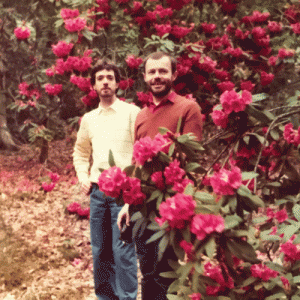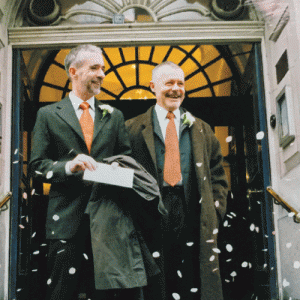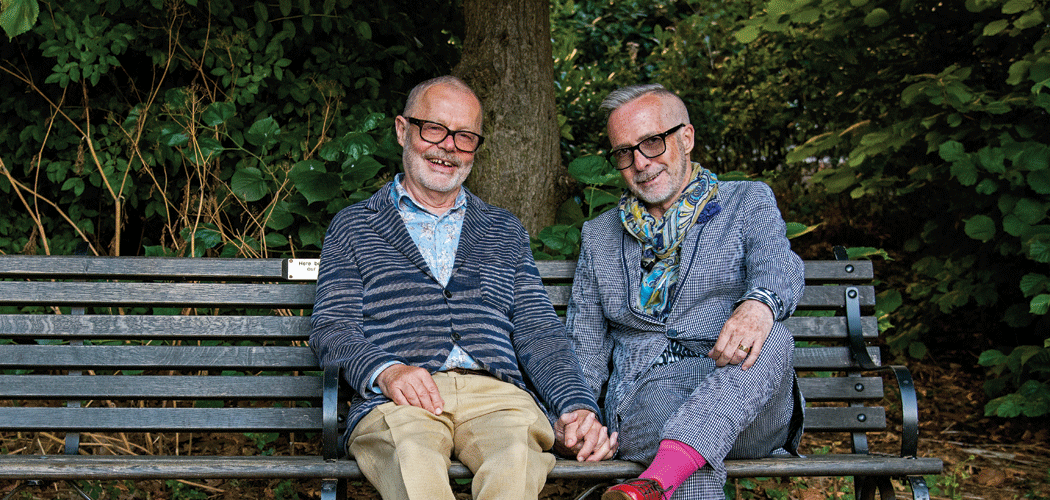Bloomsbury residents Tony Tugnutt and Robert Senecal have been a couple for over 40 years. While they met each other and started living together after the Sexual Offences Act 1967 was passed, living life as a gay couple has not always the smoothest of journeys, as Luke Till finds out.

When and where were you each born?
Robert: 1946, Caterham, Surrey.
Tony: And I was born in January 1949 in Brighton.
So when the law changed in 1967, you were 18, Tony, and Robert, you were 21. And when did you meet each other?
R: Oh, erm… 20 March 1975.
And where was that?
R: Outside Lloyds bank in Brighton.
You just bumped into each other?
R: No, I’d seen him walking down the road ahead of me. Did you stop because it was raining, or did you go in the bank? I was going to the bank…
T: I was going to the bank. And then I was going up to London.
So you spotted Tony and pursued him?
R: Yes, I picked him up.
T: And I had some dry cleaning, so I said, “Could I leave this at yours, because I’ve got to catch the train?” And that gave me a reason for going back later. And then I went back and he seduced me with hot chocolate in an amber cup and saucer, and the chocolate through the amber-coloured glass looked shit, and I thought, ‘I don’t think this is going work…’
R: But he kept on coming back – you can guess why.
When did each of you realise you were gay?
T: I realised I was gay – well, different, I suppose – when I was about five or six, and then absolutely knew when I was about 12. And then actively started to do things about it, you know…
In your early teens?
T: Yes.
With other boys at school?
T: Yes.
R: And I was 22.
And why was it so late for you?
R: Partly because I came from a more countrified area, I suppose, and things weren’t talked about in those days.
And so when you were 22, that was the year after the law changed – do you think that there was a reluctance to acknowledge it before the law changed? Was it easier once that law had changed?
R: I think at first I was a bit frightened and that I was the only one around.
And Tony, did you come out, or was that unnecessary?
T: Well I wasn’t out particularly at art school except with people that I got off with. But when I started work I decided that I was going to be out. And I worked in the City for 20 years, so in a fairly ‘straight’ environment, and I was out. And it worked; I had no problems with my colleagues at all – no off-colour comments or anything – because I think they respected the fact that I respected them because I assumed that they wouldn’t have an issue with it. And I didn’t feel it was anything to be ashamed of. It felt entirely natural and right for me so I didn’t feel like ‘Why should I apologise? Why should I keep it a secret?’ And it worked. And that would be my advice to anybody, because people know. People know. You know when people come out to relatives or whatever and they say, “Well we actually did have an idea…” And if you don’t come out you look a total tit.
I had an episode last year at a family funeral when somebody I’d never ever spoken to before – the wife of a second cousin – came up to me as we were leaving and said through the car window, “We always thought you were decadent” – you know, depraved, dirty, disgusting. And so just like that I said, “I do hope so, I really work quite hard at it.” And I thought ‘Fuck you, bitch!’ And half an hour later we were sitting in the The Colonnade pub in Brighton and I sat next to this woman who said she was a medium – but Bob was convinced she was on the game – and she had a big feather boa and great big titties, and I was sitting next to her chatting away, and I thought: ‘Maybe they’ve got a point!’ Maybe I am that way. But it took me aback just slightly.
R: But they might have been religious or something, we don’t know.
T: Yeah, but I don’t see what gives them the right to make those sort of judgments about us. I don’t mind being called decadent, I actually quite like it.
But it was what she was implying with that comment that hurt.
T: Yeah, yeah. Out of the blue.
As you were each growing up, how were gay men regarded within society? In the 50s, in the 60s…
R: I always thought of gay – well they weren’t called gay, they well called homosexuals – as dirty old men in raincoats. There weren’t any young attractive ones, as far as I was concerned… [laughs]
T: We thought of people being gay as Larry Grayson…
R: That was later though…
T: Well the Carry On films then. Kenneth Williams and people like that.
R: When Round the Horne was on the radio, I seemed to know that it was directed at people like me but I didn’t know why.
T: You mean you got the joke?
R: Yes, I thought it was funny.
T: But there wasn’t what you would call ‘positive’ images.

What was the likelihood that if you were found to be gay or had a dalliance that you would go to prison? Was that a real possibility when you were young men?
T: I suppose there was a theoretical possibility.
R: Well you would’ve been more or less underage, and I hadn’t started, so we weren’t old enough.
T: But I do remember the Act. And I do remember seeing Leo Abse on the telly and remember thinking he was a bit of a fruit; he had these Regency style, double-breasted coats, so he was quite a flamboyant character. But I don’t think the passage of the Act really affected attitudes, certainly as far as the police were concerned, because we were given grief. We’d be going out to discos or clubs or whatever and then catching the late bus home, standing at the bus stop in Trafalgar Square or wherever and the police would start harassing you. They knew. They could tell we were gay. That was in the mid to late 70s. So it hadn’t really changed.
In what way would they harass you?
T: They’d walk up to you and ask you where you’d been, what you were up to, in a rather contemptuous way.
R: As if there weren’t better things for them to be doing.
T: I mean we weren’t drunk, we weren’t misbehaving, we were just standing there waiting for the bus.
R: So ten years later and things hadn’t really changed, on lots of levels and for lots of people. We were in slightly artistic circles so it didn’t really affect us very much. But in the general population people didn’t come out as gay.
Even in the late 70s?
R: Yes. Lots of people hid their sexuality.
I think that’s what I’m trying to get at – there’s this year, 1967, when the law changed, and so one assumes after that everything must’ve been fine. But like you’ve just said, it wasn’t. It took a long time.
R: Obviously if you were doing some artistic thing like acting you’d meet gay people. But if you were doing an ordinary job like a bank clerk or something it wouldn’t have been easy at all.
T: I think in the 70s, being gay or having a gay friend was regarded as cool. And so we would be invited to a lot of dinner parties. But of course, inevitably, the AIDS epidemic in the 80s changed that. No longer was it cool to be gay; in fact it was dangerous, we were regarded as being public enemy number one. It was only a brief period, really, a little window, that it was cool and that it was fine. And I still don’t think it’s entirely gotten back to where it was before.
So there was a sort of heyday in the 70s?
T: I think there was. We had our moment in the sun. I went to New York in ’74 and went to Fire Island and everybody was glamorous and buff and tanned. And I felt quite intimidated because I was pale…
R: And skinny.
T: And I just played fey and English and different, and that worked too because they found that amusing. I knew I couldn’t compete with the gym bunnies. But it was an amazingly hedonistic atmosphere. Friends and I would go on coach trips to the islands and drink Bloody Marys. It was really chilled and friendly. But now of course most of those people are dead. Proportionally an amazing number of them died [from AIDS], and died horribly, and I miss them terribly. And so we didn’t have the experience of growing old together. And that is something you never get over.
But in the UK, Princess Diana really did lift our spirits at a very dark time. To have someone so stylish and elegant, and so natural and spontaneous, embracing desperately ill gay men was beyond miraculous. She really was exactly the right person at the right time. When she was planning to visit a new AIDS ward there was discussion as to whether she would wear gloves to greet the patients, but on the day she visited it was a huge relief to see her without gloves and those photographs have since become iconic.
What are your thoughts on where LGBT+ rights stand today?
T: Personally I don’t feel optimistic at all. I think the demographic is going to change and it’s not in a positive direction. There was a survey conducted about parents’ attitude towards having gay children, and generally across the country it was fine. In London – particularly in London – it wasn’t, and you can only surmise, or I surmise, that it’s to do with the increase in some ethnic minorities’ attitudes towards homosexuality. And I think the more that those populations increase, the worse it’s potentially going to be. Obviously that’s why the law is very important, to protect us. So I think people have to be constantly vigilant, you can’t be complacent about these things.
I did hear a very interesting interview where they had on a Holocaust survivor and somebody who had been involved with the Stonewall Riots. And both of them said, independently, that the lessons they drew from their own personal experience was that you could not be complacent. You cannot say, “Right, that’s a battle won, let’s get on with life.” You have to have zero tolerance and constantly be on the lookout for any sign of prejudice. Because I love to think that we could reach the stage where parents knowing that they’ve had a gay child would think that it’s a blessing, rather than vaguely tolerate it. Because I think that gay people are fabulous.
And they serve a purpose within families and society too.
T: And I am proud to be gay. The contribution that we make to life in every field… We are a fantastic resource. And so, being very positive about it, almost in an assertive way, we should have privileged status, rather that being a persecuted minority. But it does seem that these things like homophobia and antisemitism etc are like a virus, and we’re all on medication, but at any time it could pop up. It just seems to be there.
And it will always be there, so we need to keep on top of it.
T: And I think it’s important to recognise that fact and deal with it together.














